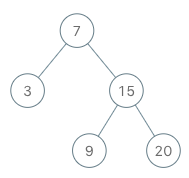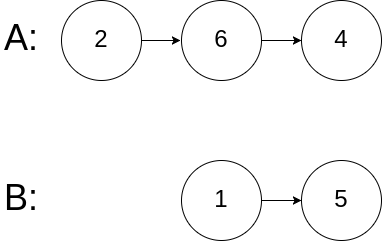Implement the BSTIterator class that represents an iterator over the in-order traversal of a binary search tree (BST):
BSTIterator(TreeNode root)Initializes an object of theBSTIteratorclass. Therootof the BST is given as part of the constructor. The pointer should be initialized to a non-existent number smaller than any element in the BST.boolean hasNext()Returnstrueif there exists a number in the traversal to the right of the pointer, otherwise returnsfalse.int next()Moves the pointer to the right, then returns the number at the pointer.
Notice that by initializing the pointer to a non-existent smallest number, the first call to next() will return the smallest element in the BST.
You may assume that next() calls will always be valid. That is, there will be at least a next number in the in-order traversal when next() is called.
Example 1:

Input ["BSTIterator", "next", "next", "hasNext", "next", "hasNext", "next", "hasNext", "next", "hasNext"] [[[7, 3, 15, null, null, 9, 20]], [], [], [], [], [], [], [], [], []] Output [null, 3, 7, true, 9, true, 15, true, 20, false] Explanation BSTIterator bSTIterator = new BSTIterator([7, 3, 15, null, null, 9, 20]); bSTIterator.next(); // return 3 bSTIterator.next(); // return 7 bSTIterator.hasNext(); // return True bSTIterator.next(); // return 9 bSTIterator.hasNext(); // return True bSTIterator.next(); // return 15 bSTIterator.hasNext(); // return True bSTIterator.next(); // return 20 bSTIterator.hasNext(); // return False
Constraints:
- The number of nodes in the tree is in the range
[1, 105]. 0 <= Node.val <= 106- At most
105calls will be made tohasNext, andnext.
Follow up:
- Could you implement
next()andhasNext()to run in averageO(1)time and useO(h)memory, wherehis the height of the tree?
就是简单的用stack来记录当前的path.
思想跟iterative in-order traversal类似。 但这里,多了一个性质,就是该树是BST (但是题目里面没有用到)。
Mistakes:/*** Definition for a binary tree node.* struct TreeNode {* int val;* TreeNode *left;* TreeNode *right;* TreeNode() : val(0), left(nullptr), right(nullptr) {}* TreeNode(int x) : val(x), left(nullptr), right(nullptr) {}* TreeNode(int x, TreeNode *left, TreeNode *right) : val(x), left(left), right(right) {}* };*/class BSTIterator {public:BSTIterator(TreeNode* root) {while(root){S.push(root);root = root->left;}}int next() {auto res = S.top();S.pop();auto runner = res->right;while(runner){S.push(runner);runner = runner->left;}return res->val;}bool hasNext() {return not S.empty();}private:stack<TreeNode*> S;};/*** Your BSTIterator object will be instantiated and called as such:* BSTIterator* obj = new BSTIterator(root);* int param_1 = obj->next();* bool param_2 = obj->hasNext();*/
1: 恩,错误是 致命的。
TreeNode* ptr = root;
while(ptr){
myStack.push(ptr);
ptr= ptr->left;
} 我写成了 TreeNode* ptr = root;
while(ptr){
myStack.push(ptr);if(ptr->left) ptr= ptr->left; }造成了死循环



